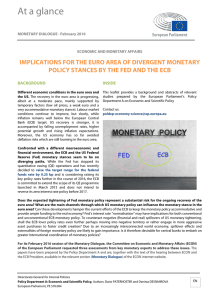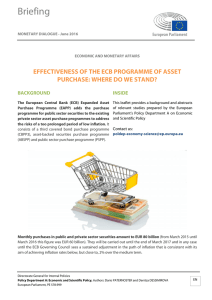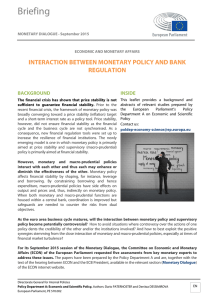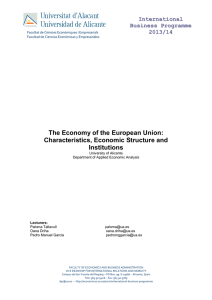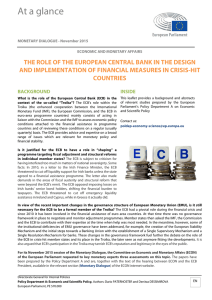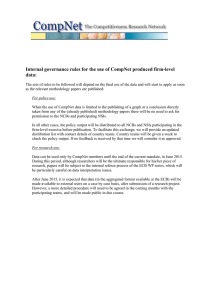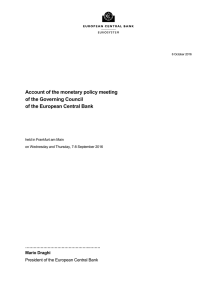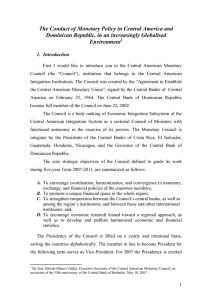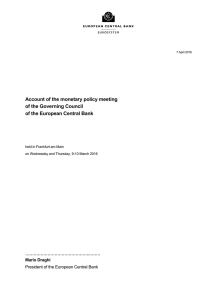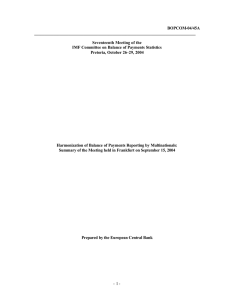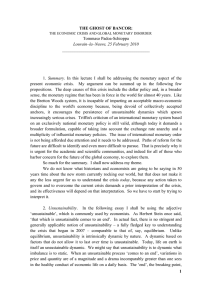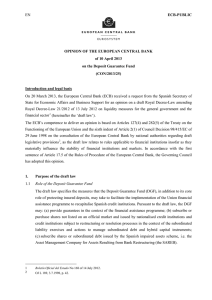Why has ECB`s very accomodative Monetary Policy not yet triggered
Anuncio
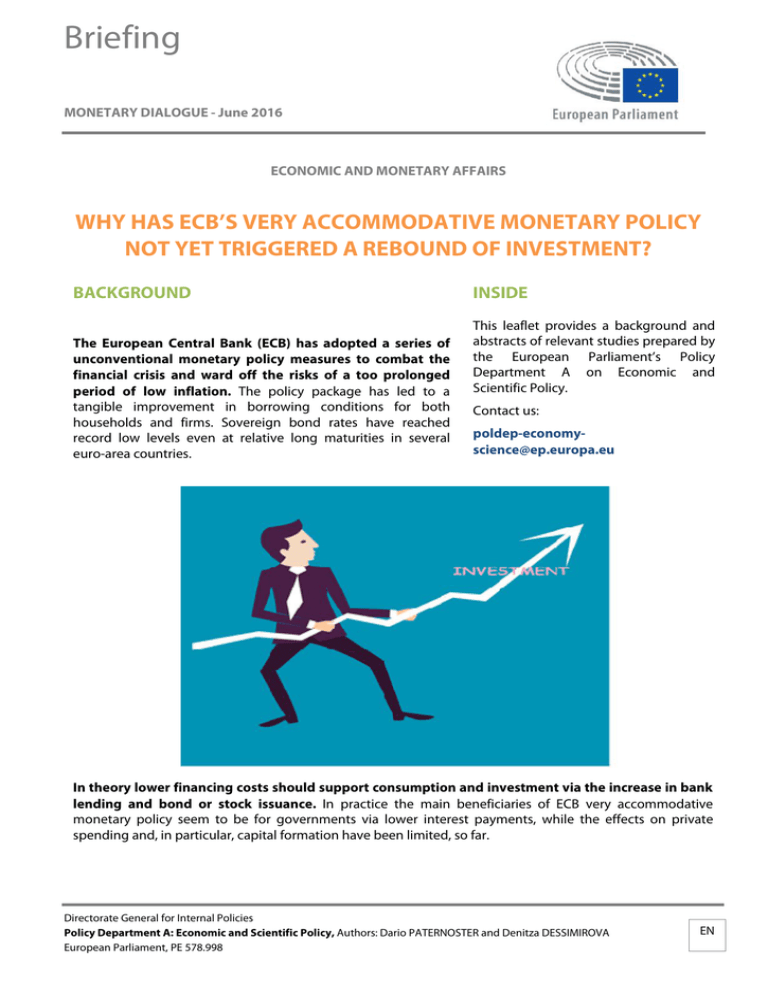
Briefing MONETARY DIALOGUE - June 2016 ECONOMIC AND MONETARY AFFAIRS WHY HAS ECB’S VERY ACCOMMODATIVE MONETARY POLICY NOT YET TRIGGERED A REBOUND OF INVESTMENT? BACKGROUND The European Central Bank (ECB) has adopted a series of unconventional monetary policy measures to combat the financial crisis and ward off the risks of a too prolonged period of low inflation. The policy package has led to a tangible improvement in borrowing conditions for both households and firms. Sovereign bond rates have reached record low levels even at relative long maturities in several euro-area countries. INSIDE This leaflet provides a background and abstracts of relevant studies prepared by the European Parliament’s Policy Department A on Economic and Scientific Policy. Contact us: [email protected] In theory lower financing costs should support consumption and investment via the increase in bank lending and bond or stock issuance. In practice the main beneficiaries of ECB very accommodative monetary policy seem to be for governments via lower interest payments, while the effects on private spending and, in particular, capital formation have been limited, so far. Directorate General for Internal Policies Policy Department A: Economic and Scientific Policy, Authors: Dario PATERNOSTER and Denitza DESSIMIROVA European Parliament, PE 578.998 EN Policy Department A: Economic and Scientific Policy BOX Transmission mechanism of monetary policy This is the process through which monetary policy decisions affect the economy and the price level. The transmission mechanism is characterised by long, variable and uncertain time lags. Thus it is difficult to predict the precise effect of monetary policy actions both on the economy and price level. The chart below provides an illustration of the main transmission channels of monetary policy decisions. Source: The ECB. Notwithstanding very attractive financing conditions, a mildly improving economy and a still large investment gap compared to pre-crisis levels, albeit with considerable cross-country heterogeneity, companies remain very reluctant to step up their investment plans. To explain the depth of the fall as well as the delay in the rebound of investment, structural factors related to private balance sheet adjustments from the debt overhang are likely to be at work. As one of the most dynamic components of demand, the rebound of investment is key for a sustained recovery of the euro area and an increase in inflation towards the ECB target. Against this background, it is important to assess potential financial constraints behind the persistent weakness of euro-area investment and discuss the reasons why ECB loose monetary stance has not triggered, so far, a rebound of investment. For its June 2016 session of the Monetary Dialogue, the Committee on Economic and Monetary Affairs (ECON) of the European Parliament requested five assessments from key monetary experts to address these issues. The papers have been prepared by the Policy Department A and are, together with the text of the hearing between ECON and the ECB President, available in the relevant section (Monetary Dialogue) of ECON internet website. 2 PE 578.998 Why has ECB’s very accomodative Monetary Policy not yet triggered a Rebound of Investment PUBLICATIONS In-Depth Analysis on 'Uncertainty Abounds: Why Accommodative Monetary Policy has not triggered a Rebound of Investment in the Eurozone' by Christopher Hartwell, Center for Social and Economic Research (CASE) Investment by non-financial firms has continued to stagnate throughout the euro zone despite a sustained and concerted effort by the ECB to keep credit flowing to the private sector. This paper argues that continued firm and bank weakness in the euro area is a leading factor of these trends in investment. Additionally, the ECB’s policy itself is creating deleterious effects, including increasing policy uncertainty. Investment will not resume without a change of structural, rather than just monetary, factors. In-Depth Analysis on ‘Business investment after the crisis and the impact of monetary policy' by Nils Jannsen and Martin Plödt (Kiel Institute for the World Economy) Monetary policy can stimulate business investment in various ways, most directly by improving financing conditions. Despite the expansionary policy of the ECB, however, business investment in the euro area has not yet rebounded, following the strong declines it experienced during the Global Financial Crisis and the Sovereign Debt Crisis. We analyse the weakness in business investment in the euro area and the role of monetary policy along three aspects. First, we investigate which factors have been the most important impediments on business investment since the Global Financial Crisis. Second, we assess how business investment has developed compared to the historical experience with other financial crises. Third, we analyse how effective monetary policy is in stimulating business investment today. In-Depth Analysis on 'Why the ECB’s Very Accommodative Monetary Policy Has Not Yet Triggered a Rebound in Investment' by Jacob Funk Kirkegaard (Peterson Institute for International Economics) The ECB’s very accommodating monetary policy stance has to date failed to spur a sustained recovery in euro area private investment levels. This briefing paper argues that this is due to the fact that ECB monetary policy directly affects only a minor component of the multifaceted causes of current low euro area private investments, namely temporarily elevated bank borrowing costs in crisis countries. Meanwhile, the ECB does not have the tools to materially affect the more important explanations for low investments. These include lower post-crisis potential growth rates in the euro area and elsewhere causing businesses to need less productive capacity in the future; an inadequate euro area fiscal policy response from 2011-14 that saw general government investment levels collapse; and persistently weak corporate profit growth limiting euro area businesses’ ability to self-finance new investments. In-Depth Analysis on 'Monetary Policy and Business Investment in the Euro Area' by Karl Whelan (University College Dublin) Business investment has been weak in the euro area for a number of years and the share of GDP allocated to this type of investment is now at a historically low level. This has undoubtedly been a disappointment for the ECB who would have hoped cutting interest rates to zero would have produced a more positive investment response. However, business investment decisions depend on more than just interest rates. Depreciation and other factors influence the potential cost of capital investment and there are important factors restraining investment in the euro area such as poor demographics, weak productivity growth and high levels of private sector debt in some member states. The banking sector has acted as a constraint on investment in recent years but now appears set to support positive investment growth. The ECB has done much to boost investment but there is still room for a large and coordinated public investment strategy to give the euro area economy a much-needed boost. PE 578.998 3 Policy Department A: Economic and Scientific Policy In-Depth Analysis on 'The impact of ECB policies on euro area investment ' by Christophe Blot, Jérôme Creel, Paul Hubert and Fabien Labondance (OFCE) We analyse the reasons for which the very accommodative policy led by the ECB has not triggered a rebound of investment. After examining the evolutions of investment in the euro area, we observe a large heterogeneity both across sectors and countries. Consequently, it is questionable that the ECB’s monetary policy can increase investment in the whole area. Therefore, we study the extent to which monetary policy impacts investment. We use a counterfactual analysis and compute the level of investment had the ECB’s decisions been different. We observe the importance of the ECB in support to investment. Indeed, the investment in the euro area would have sunk without accommodative – first conventional, then unconventional – monetary policy. Finally, we lay the emphasis on the role of credit demand as one of the main determinants of investment since the 2008 crisis, which has depended among others on the impact of deleveraging and fiscal consolidation. POLICY DEPARTMENTS MONTHLY HIGHLIGHTS The five policy departments are responsible for providing - both in-house and external - high-level independent expertise, analysis and policy advice at the request of committees and other parliamentary bodies. They are closely involved in the work of committees which they support in shaping legislation on and exercising democratic scrutiny over EU policies. Policy departments deliver policy analysis in a wide variety of formats, ranging from studies and in-depth analyses to briefings and the Fact Sheets on the EU. This written output serves a variety of purposes by feeding directly into the legislative work of a specific committee or serving as a briefing for delegations of members. The Monthly highlights provide an overview, at a glance, of the on-going work of the policy departments, including a selection of the latest and forthcoming publications, and a list of future events. To receive this publication send an email to: [email protected] CONTACTS Policy Department A: Economic and Scientific Policy ECON - ENVI - EMPL - IMCO - ITRE - TAXE [email protected] SUPPORTING ANALYSES Access all Studies, In-depth analyses, Briefings and At a glance notes produced by the Policy Departments. All publications: www.europarl.europa.eu/supportinganalyses DISCLAIMER The content of this document is the sole responsibility of the author and any opinions expressed therein do not necessarily represent the official position of the European Parliament. It is addressed to Members and staff of the EP for their parliamentary work. Reproduction and translation for noncommercial purposes are authorised, provided the source is acknowledged and the European Parliament is given prior notice and sent a copy. This document is available at: www.europarl.europa.eu/studies Contact: [email protected] Manuscript completed in June 2016 © European Union Internal Ref: ECON-2016-02 PE 578.998 CATALOGUE: QA-01-16-642-EN-C (paper) CATALOGUE: QA-01-16-642-EN-N (pdf) ISBN: 978-92-823-9434-2 (paper) ISBN: 978-92-823-9433-5 (pdf) doi:10.2861/128178 (paper) doi:10.2861/795352 (pdf)
